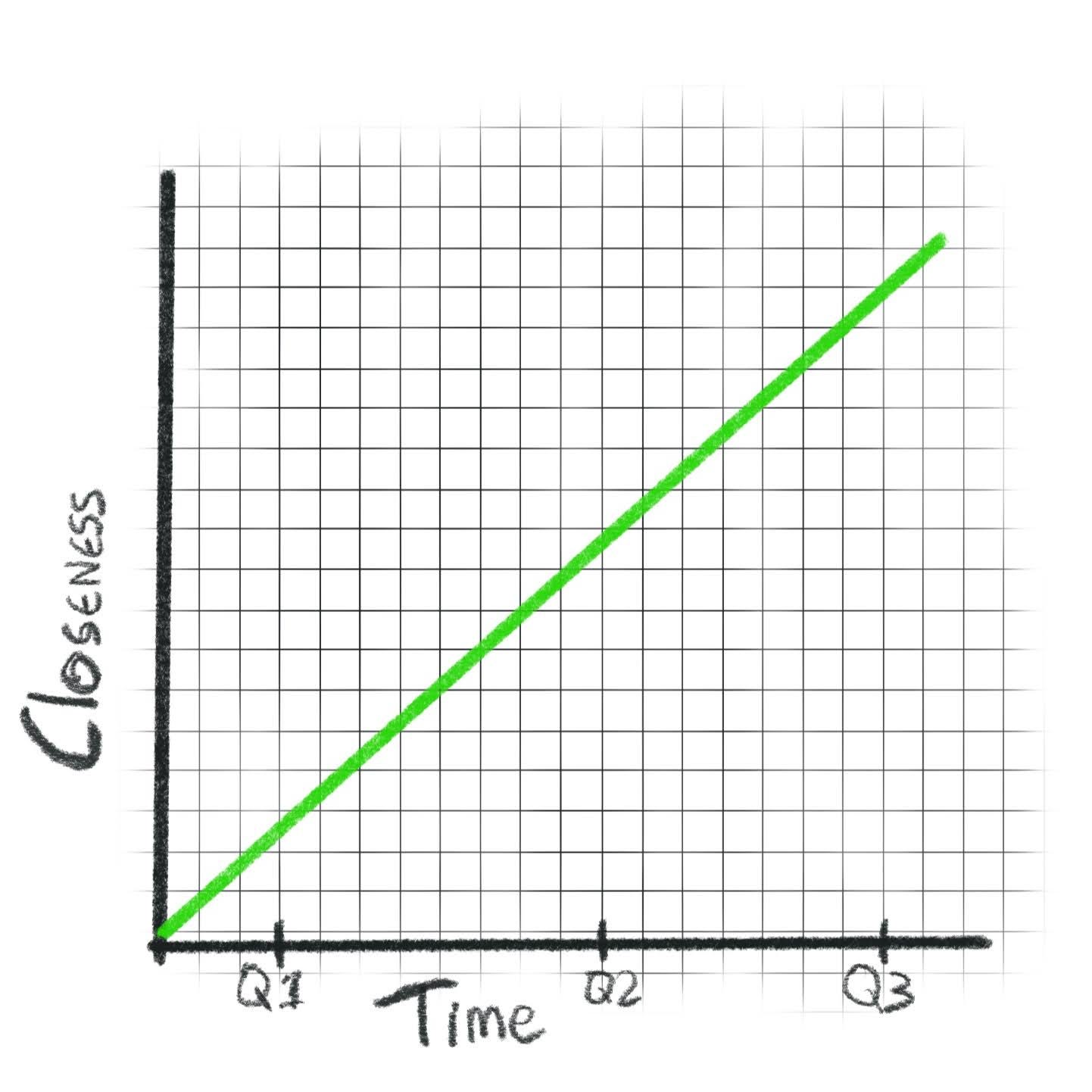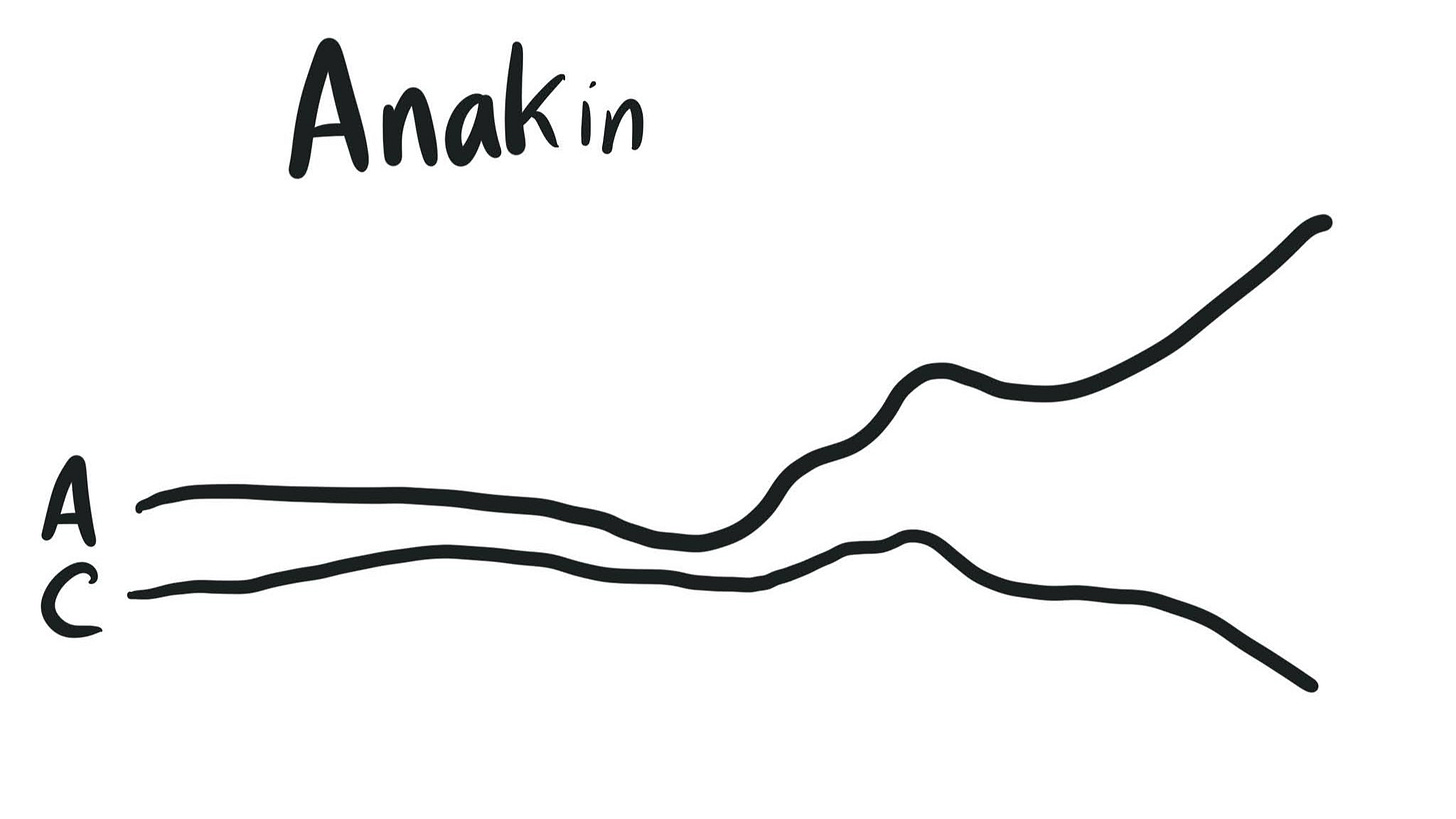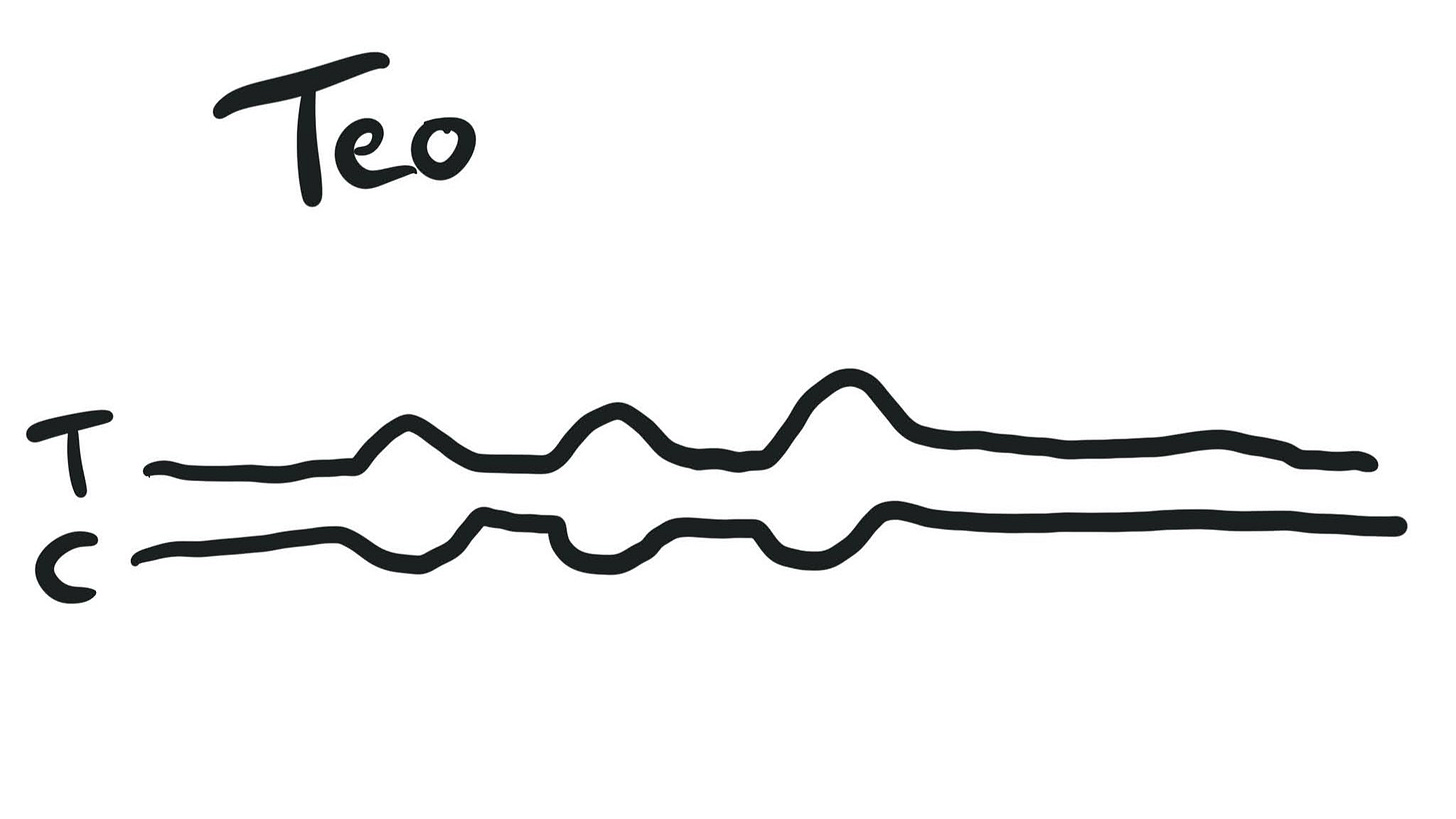Friendship Lines
Am I a good friend?
Hello friends and welcome to new subscribers! 🎉 It is always an honor have your attention. Enjoy this week’s essay!

I blocked her from Instagram.
Harsh? Maybe. Warranted? Who knows.
At the time, it seemed like the only course of action. I mean, friends make plans, right? Friends follow through with plans. The whole “it’s a tennis match” metaphor. Not me trying to make plans, as if I’m talking to myself in the mirror. Not her, saying how much she misses me, yet not making an effort to agree on a time and place despite living 16.1 miles and 32 minutes apart.
I’m typically not like this. I’m cautious with indictments. Conciliatory over punitive. But this was different. I expressed romantic feelings towards her months before this final judgment. The time wasn’t right, she said. I accepted this and tried to preserve the friendship (which I cherished). She agreed that we could still be friends. Perhaps the damage was done and her passive avoidance was the logical conclusion of my earlier transgressions.1
I blocked her because the friendship was dying slowly and I had to put myself out of my misery.
Writer/Cartoonist Olivia de Recat (drawingolive) has this illustration that visualizes relationships as lines. Lines converge and diverge.2 They bubble before rejoining. One line ends while another continues.
Perhaps you become roommates. Lines draw closer. Perhaps you move to different cities. Lines pull apart. Perhaps you took a trip together. Lines draw closer. Perhaps one of you had a possessive partner. Lines pull apart.
These lines show friendships as they truly are: Not linear relationships with an x/y axis where friendship intimacy/time increases steadily. They illustrate the complex and unpredictable nature of friendships–more like seasons, less like earning reports.
There are friendship winters that freeze the relationship and it can never be unfrozen. Others that make you appreciate that person even more.
There are friendship summers that burn so intense they forge a bond between two people. Others that burn so intense they burn a friendship out.
Big life events like moving to a different city, getting married, having kids, usually onset a change in dynamics in a friendship. It’s impossible to predict which of these events will bring you closer or pull you apart. I’ve had friendships where changing cities strengthened the quality of our bond. I’ve had friendships where changing cities was the unceremonious end.
This once-promising friendship that ended in Instagram stonewalling caused self-inquiry. I began seeing all my friendships as lines. I asked myself: Why does one friendship thrive while the other flounders? Why do plans emerge naturally with one friend and texts go unanswered with the other?
I searched for answers to justify my decision, or at least, to figure out how to be a better friend.
Anakin3
I had a good friend–let’s call him Anakin. Anakin and I became good friends through long work days, lunchtime walks, and “we don’t want to update our CRM, so let’s philosophize” sessions. We used to have hearty debates about the Western world, cryptocurrencies, technology, and racial relations.
Our respect was rooted in our ability to have disagreements about big, heavy things, and still see the best in each other. We grew close. When he became a US citizen, I was at the naturalization ceremony. It was one of the proudest moments of his life. It’s one of my favorite days. I went to his wedding and danced the night away celebrating his love.
Eventually, we moved to different cities. His view of the world hardened; triggered by the politics around COVID and the changing zeitgeist where everything became politicized. Nuance was thrown away and tribal allegiances had to be set.
I sensed that the relationship was decaying; less frequent contact, comments that felt like digs over curious inquiry, humor exhausted. I offered to have a call and catch up. He dryly responded that there wasn’t much to talk about since I worked for “the devil” (Google). Mind you, this is someone who used to work at Google, along with his wife. As I politely reminded him that his wife still worked at Google and that his accusation was rather unfair, he became extremely defensive and claimed I was threatening his family. Befuddled by his stance and unsure of how to proceed, I pulled away. That was the end of the friendship.
I think about Anakin often and what could have been. Any breakup–both romantic and platonic leaves me asking “what if?” It’s probably not healthy. But that’s where my mind visits often.
I try to visualize all past interactions, going into the video gallery of my memories and study each vignette. I rewind to that testy exchange we had on gun control, and I wonder if I said something offensive that created untreated resentment. I try to remember if I missed a birthday and didn’t own up to it properly. It’s a futile exercise. All I’m doing is interpreting events through my lens–and that’s half the story. Useful for self-awareness, but doesn’t stop the drift.
Friendship lines drift because life changes trigger personal transformations that can lead to incompatibility–like a plant outgrowing its pot and needing its own separate space. They can also drift if one or both parties aren’t intentional in maintaining the friendship (the plant wasn’t appropriately cared for. It wilted).
Family building is one of these life changes. Suddenly, the journey of starting a family becomes all-consuming. Doctor’s appointments, weeks of disappointment, and then, if things go well, the treacherous journey of pregnancy where you are supposed to live life while cramming for the ultimate test: Parenthood. Naturally, couples erect new boundaries. Naturally, friends may feel slighted because friends that never said no to brunch plans, now decline because they need to learn baby CPR.
Moving cities is another change that all too often causes friendship lines to grow apart. The camaraderie built over multiple seasons at the neighborhood softball league and dozens of happy hours, now stand at a crossroads. Absent new rituals, deep conversations, and making joint plans, any bond will gradually loosen to be replaced with new friends who you develop new rituals, conversations, and plans with.
Does this mean I’m unable to stop the drift in my friendships?
Not quite. I have agency. I can try. I can have difficult conversations with friends where I ask them: “I feel like there is something off between us. Do you feel the same way?” I tend to avoid being this deliberate because it is implied that people should just know how to be friends.
If you think about it, there isn’t much literature about being a good friend. Like there is no mastermind course on being a good friend. It’s all taken as a given. As obvious as breathing. But people don’t even know how to breathe correctly.4 So you have to have those difficult conversations.
Not all friendships are meant to last forever, though. Time is finite, and this means prioritizing relationships. Sometimes I’m prioritized and other times I’m deprioritized. This reality will only cause anxiety as long as I resist it.
Teo
Teo and I have been friends for about 15 years. We met scrunched in the back of a sedan on our way to lobby politicians to fund public university education. Conversation was unavoidable. And we’ve been talking ever since.
Our conversations cannot enforce a time limit, nor do they have a logical progression. It’s always a series of ideas, anecdotes, and gossip that mimic a jazz freestyle. Our friendship has survived living in separate countries, coasts, and spending a good chunk of the last 15 not physically in the same place. I walked her down the aisle. She knows more about me than everyone else outside of my mother and brother. We’ve been there for each other’s heartbreaks. We know how to give cutting and loving advice–the one we don’t want to hear, but sorely need.
I have wondered how this friendship has managed to exist and grow. How the lines always manage to merge despite the changes we’ve experienced.
The main ways I can deepen friendships–bring the lines closer–is through presence and intentionality. If a friendship has neither, it drifts. If it has one, then you may be able to keep it at bay, but it will not grow closer.
I used to treat plans like a game of hot potato–making plans made me anxious. I had to come up with the perfect plan so my friends would stick around, I thought. So I made none, hoping for spontaneity instead. But spontaneity gives way to inaction. Our penchant for convenience translates to waiting for someone to take care of making plans for us.5 I mean, how many times have you’ve had this dialogue:
Friend: “It’s good to see you! We should hang out sometime.”
You: “Yes, totally. Let’s.”
Friend & You: [No follow up.]
*Sixth extinction happens before plans are made*
Now, not every interaction in a friendship needs to be planned. Not every plan needs to be a 7-day excursion to the ruins of Atlantis.6 But I realized I was slacking in my friendships and not proposing things regularly. It’s not that hard to say: “Hey, want to do X at time Y?”
In the same way I’m learning to be intentional about making plans, I’m learning to be intentional about conflict resolution.
The longer you are friends with someone, the more likely either of you will do something to upset the other. It’s physics. You don’t fire friends at the first offense–no friendship would be able to survive that. But if you develop a pattern of conflict avoidance, you are putting all your slights and transgressions in a pressure cooker. It’s a matter of time before it blows up. It’s physics. Easier to clean up a spilled drink than a steam explosion.
Equally important is the idea of presence. Friendship lines come closer in those moments of crisis where life gets hard and you dread doing it alone. A parent’s sudden death, a devastating break up, a firing that triggers an existential crisis.
We measure our friendships by the trust built as we share our souls (intimacy), but also in the moments of crisis where we are most vulnerable (loyalty). And you don’t have to physically be there (though that always helps). It can be as simple as a check-in text, or buying them dinner to be delivered to their place. The ways we can show our friends “I’m here for you” have grown thanks to the Internet. I’ve done all of these and received all of these. They make a difference.
An underrated way to deepen a friendship is also being present in the moments of celebration and joy. I tend to downplay my accomplishments: To not be self-indulgent, or I’m dealing with impostor syndrome, or I’m in a hedonistic wheel and I’m looking for the next milestone.
Friends serve an important role in grabbing us by our shoulders and shaking us into admission that we did something great. Send flowers. Send champagne. Take them out to dinner. Write them a card. Help them turn a milestone into a memory. This is another way we can actively show people their strengths and virtues.
Like most worthwhile things in life, friendships like the one I have with Teo take commitment, intentionality, and presence.
Keep Drawing
My study of my friendship lines isn’t conclusive. I’m filled with regrets and lessons. I think I’m getting closer to being the friend I want to be, but that’s not for me to decide.
Sometimes, I wish I didn’t block my friend from Instagram and guillotined our friendship. I wish we had a conversation about her words not matching her actions. I wish I had given her an out: “Look, you know I had feelings for you. And if you truly think I can’t move on, let’s just walk away. No harm.” I wish I could have talked things out with Anakin.
Yet, I have to accept that some friendships are finite–no matter what I do to keep those lines running parallel. They can diverge forever.
I’ve accepted the duality of wishing I could do things differently, but moving ahead all the wiser and less angry at myself.
I’ve learned that long friendships don’t just happen. You have to keep drawing the lines. It doesn’t take much to draw them; sending a meme, giving a hug, telling friends what I appreciate about them. Consistent intentional acts that deliberately show them I want to be part of their life in my most authentic form. No bullshit or social masks. My quirks and peeves and our inside jokes and future plans.
Keep drawing these lines.
Thank you to Alia Irshaid Gilbert, Charlie Bleecker , Latham Turner, Rick Lewis, Haley Brengartner & Foster editors (Caryn, Alicia Kenworthy, Amna Faiq Ali, and Michael Shafer).
Any time a couple tells me that they started off as friends for years and then realized they were into each other, part of me thinks that they just met online and this is just a cover story. Based on my own experience (failures), I’m incapable of accepting this as a thing that happens.
Not his real name. There were just Obi-Wan/Anakin vibes in this friendship though.
For instance, breathing through your mouth? That’s a no in most cases
If you browse your city’s dating profiles, you’d likely find that men are a big culprit of this (One profile I saw months back said: “The win to win me over is to propose a time and place.” That’s a low bar).
Probably not a good idea get on a submarine right now anyways.






Camilo, I wish I could write an essay on your essay. It’s just so brilliant and so grounding. I really admire how your writing is evolving through time.
So many perspectives to cite. I was really drawn to this one: “All I’m doing is interpreting events through my lens–and that’s half the story. Useful for self-awareness, but doesn’t stop the drift.”
@Rachael Tiss has a wonderful definition of friendship that she can offer if she sees this.
I have a collection of deep friendships that include one of two people from each stage of my life grade school, high school, college, first employer, second employer, etc.
The common denominators we all have is that we are all super listeners (listening is wanting to hear) and we all care about each other more than our differences and our slip ups and transgressions over time. I guess there’s a humility present in all of us. At age 57, it is like a rich tapestry that could have only been woven one conversation at a time.
Thank you again for your profound contribution here.
(BTW, I think I started my essay. Sorry)
I remember coming across that visual and it made me so sad.
I think about friendship probably every day, and this piece resonates.
Platonic relationships don’t get as much love and attention as they deserve across the board.
Thank you for sharing! This was lovely.